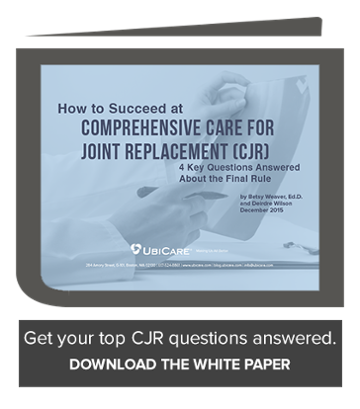
Improving the patient experience with rehabilitation and recovery after joint surgery counts big in CMS’s new Comprehensive Care for Joint Replacement (CJR) payment model. So it behooves hospitals to manage patient expectations about their discharge destination and rehab care as early in the care episode as possible.

Hospitals participating in CJR over the next five years must reduce care costs and improve quality of care—not only for a patient’s hip and knee replacement surgery but also through 90 days of rehabilitation and recovery.
CMS sees huge savings to be gained here. As the Institute of Medicine notes, there is wide geographic variation in the cost of post-acute care following joint replacement and potentially substantial savings to be gained by directing patients to “home care rather than institutional care when appropriate.”
Under CJR, hospitals must build and leverage cost-effective relationships with both post-care institutions and home-care services, while keeping patients satisfied and well cared for during the rehabilitation period.
Long before discharge from a hospital, however, many patients already have an idea of where they should go after surgery, and it’s often not home. They may think, “I’m better off going to a professional rehab facility where they take care of me while I’m getting better. If I went home, something could happen and I’d have to go back into the hospital if I had problems. I’d do better in a rehab center. I’d worry less, there’d be lower risk and I wouldn’t burden my family.”
Yet research continues to find that in-home rehab after knee or hip replacement surgery is not only more cost-effective, but also equal in outcome and satisfaction, as compared to rehab at an inpatient facility.
Both a 2008 study by researchers at Toronto Western Hospital and a larger, more recent study at the Hospital for Special Surgery in New York found no significant differences in pain, complication rates, outcomes or satisfaction among patients who received home-based rehab vs. those who received inpatient rehab.
Patients look to their doctors to set expectations for surgery and recovery. Effectively communicating the health information patients need is important well before they’re offered a choice or told where they will go after discharge. When this preparation starts before hospital admission and continues throughout the care episode, everyone benefits—the patients, their family and the hospital. When preparation and expectations aren’t managed, that care episode is costly for all.








